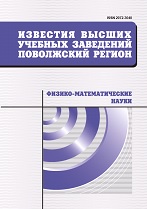|
This article is cited in 1 scientific paper (total in 1 paper)
Mathematics
Sufficient conditions of system solutions stability of ordinary differential equations with time-delayed systems. Part II. Linear equations
I. V. Boykov
Penza State University, Penza
Abstract:
Background. The work is devoted to the analysis of stability in the sense of Lyapunov of steady-state solutions of systems of linear differential equations with time-dependent coefficients and with time-dependent delays and a differentiated function on the left side of the equation. The cases of continuous and pulsed perturbations are considered. Materials and methods. The stability study is based on the application of the method of “freezing” of time-dependent coefficients and the subsequent analysis of the stability of the solution of the system in the vicinity of the “freezing” point. In the analysis of systems of differential equations thus transformed, the properties of logarithmic norms are used. Results. An algorithm is proposed that allows one to obtain sufficient criteria for the stability of solutions of finite systems of linear differential equations with coefficients and delays that depend on time and on a differentiable function on the left side of the equation. Sufficient conditions are obtained in the Euclidean metric. Algorithms are effective both in the case of continuous and in the case of impulsive perturbations. Conclusions. The proposed method can be used in the study of nonstationary dynamic systems described by systems of ordinary linear differential equations with delays that depend on time and on a differentiable function on the left side of the equation.
Keywords:
stability, systems of ordinary differential equations, delays that depend on time and on a differentiated function on the left side of the equation, Euclidean metric.
Citation:
I. V. Boykov, “Sufficient conditions of system solutions stability of ordinary differential equations with time-delayed systems. Part II. Linear equations”, University proceedings. Volga region. Physical and mathematical sciences, 2019, no. 1, 63–77
Linking options:
https://www.mathnet.ru/eng/ivpnz130 https://www.mathnet.ru/eng/ivpnz/y2019/i1/p63
|

| Statistics & downloads: |
| Abstract page: | 59 | | Full-text PDF : | 19 | | References: | 21 |
|




 Contact us:
Contact us: Terms of Use
Terms of Use
 Registration to the website
Registration to the website Logotypes
Logotypes








 Citation in format
Citation in format 
